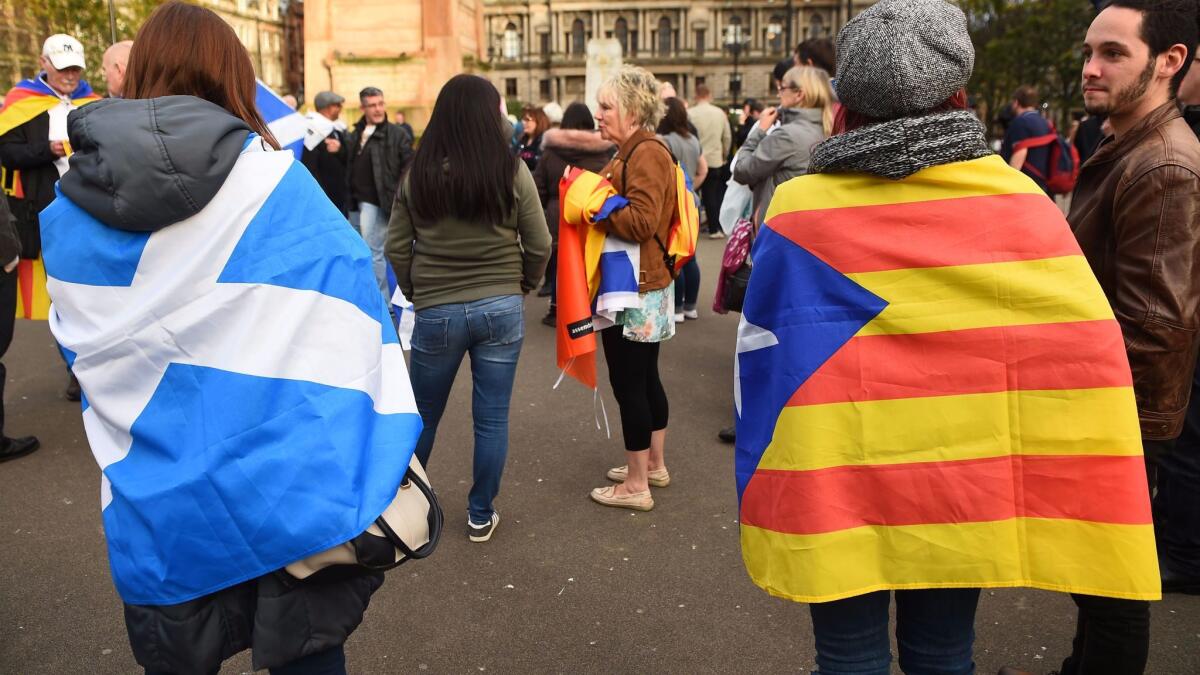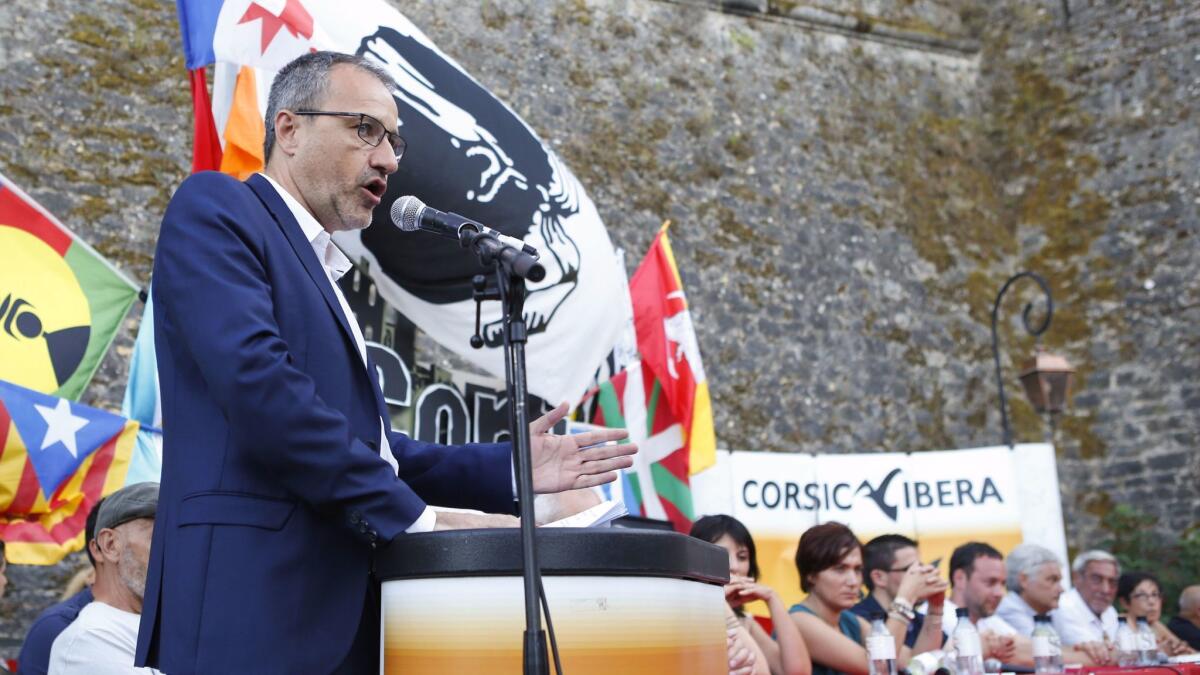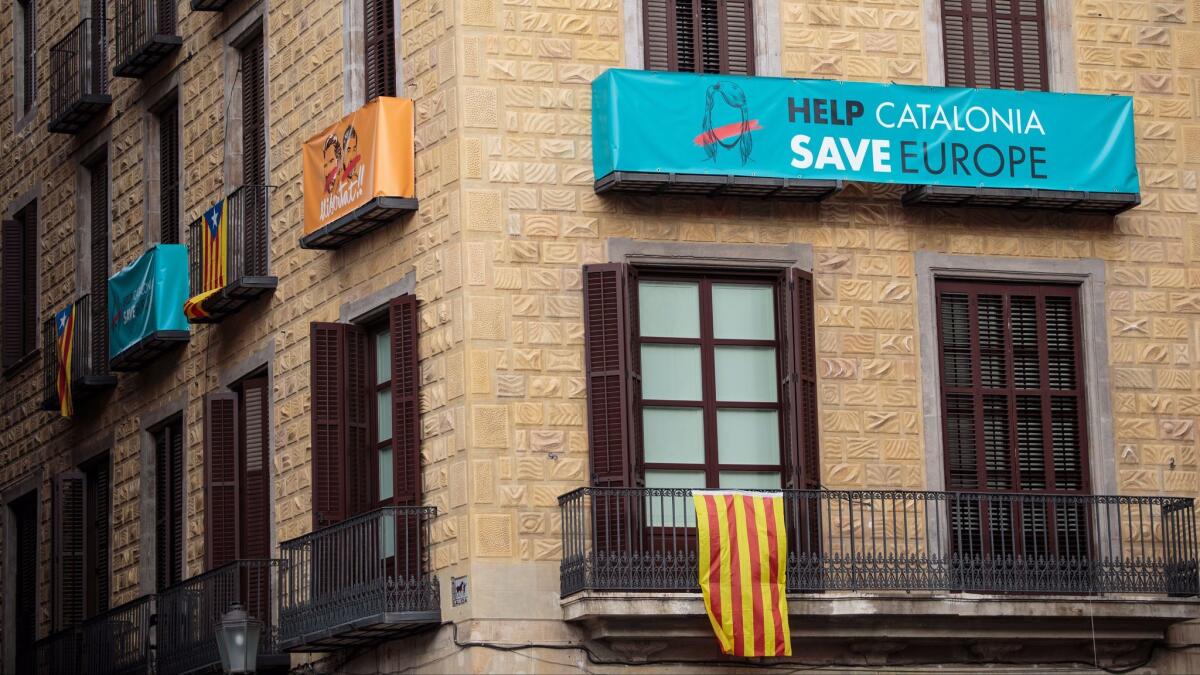Catalonia crisis encourages separatists, but could it fracture Europe?

Across Europe, separatists have eagerly watched Catalan activists declare their independence in a crisis that threatens to fracture not just Spain, but the European Union.
The decision by the parliament in Catalonia to declare independence last week has galvanized independence movements in other European countries. It followed an Oct. 1 independence referendum that was supported by a majority of voters but ruled illegal by the Spanish government.
Europe has seen an upsurge in nationalism in recent years. It has taken the form of a conservative backlash against an influx of immigrants from Africa and the Middle East, but also appears as a mostly leftist movement for more local rule in places such as Catalonia, Scotland, the Flanders region of Belgium, the Corsica region of France and parts of northern Italy.
The president of the regional assembly in Corsica, who leads the independence movement known as Corsica Libera, hailed the “birth of the Catalonia Republic.”

Experts said these separatists have been encouraged by Catalonia’s independence bid and are gaining strength, but are unlikely to declare their own new republics because they have other legal paths to achieve greater autonomy.
No major European leader has recognized Catalonia as independent, attempting instead to present a united front with Spain.
“[The EU] doesn’t need any more cracks, more splits…. We shouldn’t insert ourselves into what is an internal debate for Spain, but I wouldn’t want the European Union to consist of 95 member states in the future,” Jean-Claude Juncker, the European Commission president, said Friday.
Sebastian Balfour, emeritus professor of contemporary Spanish studies at the London School of Economics and Political Science, said the “response of European governments to the events in Spain reflects a certain degree of insecurity among them about fragmentations [and] the idea that once one of these regions is independent, then this will start a stampede.”
One exception to European leaders ignoring independent Catalonia was Belgian Prime Minister Charles Michel, who condemned the police crackdown during the Oct. 1 secession vote.
“Violence can never be the answer! We condemn all forms of violence and reaffirm our call for political dialogue,” Michel tweeted.
Michel is a Francophone liberal, but Belgium has seen an upsurge in Flemish nationalism in recent years, with separatist parties gaining power. On Saturday, Belgium’s immigration secretary, a member of the leading separatist party, said Catalan officials could seek asylum there if prosecuted by the Spanish government for their role in organizing the secessionist referendum, which under Spanish law could be considered sedition. (Catalan separatists across the border from Catalonia in Perpignan, France, also offered the leaders asylum.)
By Monday, ousted Catalonian President Carles Puigdemont and other officials had traveled to Brussels and the Spanish government had announced it was seeking to charge them with sedition and other crimes that carry a potential prison sentence.
“Among Flemish nationalists there is a lot of enthusiasm about what has happened in Catalonia because that is what they have always wanted the Flemish parliament to do: to declare Flanders a sovereign state,” said Bart Maddens, a Flemish nationalist professor at the Catholic University of Leuven.
If federal police are filmed beating Catalan independence supporters again this week, as they were during the independence vote, Maddens said that could fuel nationalist movements across Europe. He served as an international observer at the polls in Catalonia, and said he witnessed some of the violence.

Among Flemish nationalists in Belgium and France, he said, there is “lots of rage because of the repression by the Spanish government” during the secessionist vote.
Flemish nationalists in northern Belgium have so far sought greater autonomy, not independence. The separatist New Flemish Alliance, the largest party not only in Flanders, but in the country, has pushed for greater fiscal independence while still relying on French-speaking Wallonia for other state functions, such as defense.
“Whether this will actually help Flemish nationalism in the long run will depend on how it ends,” Maddens said of the crisis in Catalonia.
Other European separatists have come close to independence in recent years, notably those in Scotland, which voted against independence three years ago, 55% to 45%, with a record 85% turnout. Scottish separatists have called for another referendum in response to Britain’s impending exit from the EU.
This month, two of Italy’s wealthy northern regions — Lombardy and Veneto, home to about 15 million people — voted for greater autonomy in a dispute over taxes. But they are not seeking independence.
“Unlike the Catalan referendum, they were perfectly in line with the Italian Constitution,” said Justin Frosini, an adjunct law professor at Johns Hopkins University in Bologna and Bocconi University in Milan.
But in five to 10 years, he said, the Italian regions may follow in Catalan’s path.
“Once you’ve got so much autonomy, what else do you want but independence?” he said.
The Spanish government has clashed with separatists for decades, mainly in the northern Basque region that borders France. The Basques lost their right to self rule with the rise of Gen. Francisco Franco in the country’s civil war. After Franco’s death in 1975, they continued to fight for independence, including violent attacks by ETA, a militant group that killed more than 800 people.
Many Basques sympathize with the struggle in Catalonian, but don’t have the same economic incentives to seek independence. Most of Spain’s regions pay taxes to the central government and then receive a portion in return to spend on health, education and public infrastructure, but not the Basque region or neighboring Navarre. Unlike Catalans, they collect their own taxes and decide how to spend them, including much more on public services.
After the Oct. 1 secession vote in Catalonia, a poll in the Basque region found 44% wanted greater autonomy, but only 22% wanted to take the same approach as Catalonia, while nearly 63% were opposed. Andoni Ortuzar, mayor of the region’s largest city, Bilbao, and president of the Basque Nationalist Party, has been seeking greater autonomy through the central government. Rather than praising the independence vote, he urged Catalan leaders to do the same.
“It’s interesting to see that the roles have reversed,” said Maddens, the Flemish nationalist. “Twenty years ago it was the Catalan government that tried to keep the Basque country on a more moderate track. Now Basque leaders are trying to push [Catalonia] toward a more constructive position.”
ALSO
A test of wills in Catalonia as Spain tightens grip on restive region
Catalunya Radio becomes a flashpoint in the independence movement in Spain
President of Iraq’s Kurdish region resigns, leaving many questions in his wake
UPDATES:
10:15 a.m.: This article has been updated with Catalonian officials seeking refuge in Belgium.
This article was originally posted at 5 a.m.
More to Read
Sign up for Essential California
The most important California stories and recommendations in your inbox every morning.
You may occasionally receive promotional content from the Los Angeles Times.











